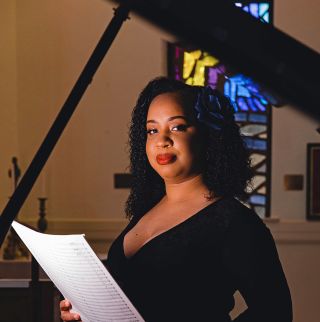Speaking Through Sound
Composer Courtney Bryan explores emotion through music.
By Abigail Fagan published January 2, 2024 - last reviewed on March 5, 2024

Courtney Bryan, a New Orleans native, fell in love with music as soon as she could climb up onto her family’s piano bench. She began lessons at 5 years old, progressing through conservatories and musical collaborations across the country; she's now a professor at Tulane University and a creative partner with the Louisiana Philharmonic Orchestra. Reflective and innovative, she combines musical genres to explore human emotion in our often turbulent world.
How do you use music to communicate?
Over time I’ve learned to put into words what I can say in music, but music has always been how I communicate with others and how I make sense of the world around me. When I’m trying to understand the world, like, say, instances of police brutality, I take in those stories and deal with my emotions through music.
I recently premiered DREAMING (Freedom Sounds), which is a meditation on freedom. I responded to recent Supreme Court dissent letters—on affirmative action, reproductive justice, LGBTQ rights. The inspiration was my father. Last summer I spent a lot of time with my parents. We had conversations about growing up in the segregated South and being part of a generation that was integrating schools. I thought about how much time and work and fight goes into gaining rights and how quickly they can be taken away.
My father was excited by Ketanji Brown Jackson’s dissent on affirmative action, so I said, “Let me read it!” There was so much there. One line, for example: “History speaks. In some form, it can be heard forever.” I found the lines that were important to me and set them to music.
When I heard the performance, I felt we had created something that leaves space for people to contribute in their own way. In one section, for example, I guide the musicians: “Think of someone you love, alive or passed along, and tell them you love them through your instrument.” Every time I hear the piece, it is a little different. It is personal for every instrumentalist and vocalist. There is freedom.
